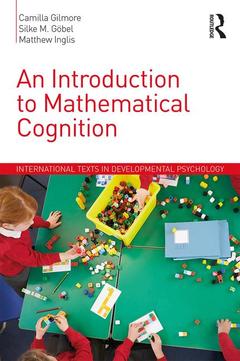An Introduction to Mathematical Cognition International Texts in Developmental Psychology Series
Auteurs : Gilmore Camilla, Göbel Silke M., Inglis Matthew

The last decade has seen a rapid growth in our understanding of the cognitive systems that underlie mathematical learning and performance, and an increased recognition of the importance of this topic. This book showcases international research on the most important cognitive issues that affect mathematical performance across a wide age range, from early childhood to adulthood. The book considers the foundational competencies of nonsymbolic and symbolic number processing before discussing arithmetic, conceptual understanding, individual differences and dyscalculia, algebra, number systems, reasoning and higher-level mathematics such as formal proof. Drawing on diverse methodology from behavioural experiments to brain imaging, each chapter discusses key theories and empirical findings and introduces key tasks used by researchers. The final chapter discusses challenges facing the future development of the field of mathematical cognition and reviews a set of open questions that mathematical cognition researchers should address to move the field forward. This book is ideal for undergraduate or graduate students of psychology, education, cognitive sciences, cognitive neuroscience and other academic and clinical audiences including mathematics educators and educational psychologists.
1. Introduction 2. Nonsymbolic number 3. Symbolic number 4. The development of arithmetic skills 5. Understanding arithmetic concepts 6. Individual differences and mathematical difficulties 7. Number systems 8. Algebra and equivalence 9. Mathematical argumentation and proof 10. Logic, conditional reasoning and mathematics 11. Where next for mathematical cognition?
Camilla Gilmore is a Reader in Mathematical Cognition in the Mathematics Education Centre at Loughborough University. Her research explores the development of numerical skills in children and adults.
Silke Göbel is a Senior Lecturer in Psychology at the University of York. She teaches courses on Numerical Cognition, Dyscalculia, Mathematics Anxiety and Neuroscience of Numbers and Arithmetic. Her current research focuses on predictors of mathematical development.
Matthew Inglis is a Reader in Mathematical Cognition in the Mathematics Education Centre at Loughborough University. He is interested in understanding the processes involved in numerical and mathematical reasoning, and how these can be promoted through education.
Date de parution : 06-2018
15.6x23.4 cm
Date de parution : 06-2018
15.6x23.4 cm
Thème d’An Introduction to Mathematical Cognition :
Mots-clés :
SNARC Effect; Mathematical cognition; SNARC; Nonsymbolic number; Standardised Mathematical Achievement Test; Symbolic number; Visuo Spatial WM; maths learning disorder; Size Congruity Effect; dyscalculia; Symbolic Number Comparison; number systems; Mental Number Line; mathematical relations; algebra; Arabic Digits; reasoning; Developmental Dyscalculia; mathematical argumentation; Numerosity Perception; higher level mathematics; Subitizing Range; cognitive development; Executive Function Skills; arithmetic skills; Number Transcoding; Silke M; Göbel; Vice Versa; Matthew Inglis; Working Memory; High Mathematics Anxiety; Left Ips; Van Dooren; Number Line Task; Mathematics Anxiety; Symbolic Number Processing; Ans; Number Words



